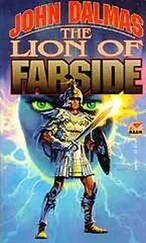John Dalmas - The Yngling
Здесь есть возможность читать онлайн «John Dalmas - The Yngling» весь текст электронной книги совершенно бесплатно (целиком полную версию без сокращений). В некоторых случаях можно слушать аудио, скачать через торрент в формате fb2 и присутствует краткое содержание. Жанр: Фэнтези, на английском языке. Описание произведения, (предисловие) а так же отзывы посетителей доступны на портале библиотеки ЛибКат.
- Название:The Yngling
- Автор:
- Жанр:
- Год:неизвестен
- ISBN:нет данных
- Рейтинг книги:5 / 5. Голосов: 1
-
Избранное:Добавить в избранное
- Отзывы:
-
Ваша оценка:
- 100
- 1
- 2
- 3
- 4
- 5
The Yngling: краткое содержание, описание и аннотация
Предлагаем к чтению аннотацию, описание, краткое содержание или предисловие (зависит от того, что написал сам автор книги «The Yngling»). Если вы не нашли необходимую информацию о книге — напишите в комментариях, мы постараемся отыскать её.
The Yngling — читать онлайн бесплатно полную книгу (весь текст) целиком
Ниже представлен текст книги, разбитый по страницам. Система сохранения места последней прочитанной страницы, позволяет с удобством читать онлайн бесплатно книгу «The Yngling», без необходимости каждый раз заново искать на чём Вы остановились. Поставьте закладку, и сможете в любой момент перейти на страницу, на которой закончили чтение.
Интервал:
Закладка:
He was dressed only for a raw autumn day, not for an arctic air mass.
Hours passed, hours that would have killed most men.
Nils felt the cold as a physical-physiological phenomenon and knew that after a time it would damage his body severely, even lethally, if he did not find shelter soon enough. The cold would be much less severe if he sheltered under the snow again, but the constant chill would deplete his remaining energy reserves without bringing him nearer to safety. Dressed as he was, to hole up again might delay death, but it would also assure it.
With each step he had to raise his feet high to clear the clumsy snowshoes from the deep, fluffy snow, and as the kilometers passed, his strides became gradually slower and shorter. His feet were like wood despite the exertion, his hands numb and useless, and his body had stopped feeling the cold. The sun had set, and he crossed another ridge in growing darkness. He was not consciously aware of it when night fell.
Suddenly he became alert, smelling faint smoke, sensing the direction of the air movement. Moving slowly, he turned from the road, plowing a deep furrow as he went. Dimly he sensed a mind, felt it sense his.
The hut was half a kilometer from the road-a hump in the snow with the door partly cleared. Other eyes saw the door through his, and as he dragged toward it, it opened. A tall woman stepped out with a long knife, cut the snowshoes from his feet, and helped him inside.
Nils awoke rested and utterly famished. The woman turned to him, pulled back the covers and let him look at himself through her eyes. He knew his hands and feet should have been swollen and split and painful, but they weren't. The skin was peeling from them, and from his face and the front of his thighs, but they didn't seem really damaged.
"My name is Nils," he thought to her. "What is yours?"
"Ilse," she answered, adding, "you have been here three nights and two days."
"How did you do it?" he asked, thinking of the hands and feet that should have been in much worse condition and might well have been gangrenous.
"Through your sleeping mind."
"How?"
"I spoke to it, leading it, and your mind led your flesh to make new flesh in the layers that were dying. My father taught me how."
Ilse's father had been one of the merchant Kinfolk, she explained, and had sensed power in himself that the Kinfolk did not know about. So he had taken his wife and small daughter into the quiet of the wilderness to meditate and explore himself, while his eldest son took his place as a merchant and subtle force in the free town of Neudorf am Donau. Another son had joined the Wandering Kin.
Ilse had grown up in the forest curious and aware, free of the psi static that most psi children grew up with in towns. So she sensed the minds of animals. In most of them there was little enough to read-anxiety, desire, curiosity, anger, comfort and discomfort, all transient. It was a background to her days, like the breeze in the tree tops.
"And then," she thought to Nils, "one day I reached out and touched the mind of an old he-wolf, and he felt the touch. For in these hills the wolves have psi. If one is born without it, they kill it so that it will not suffer the handicap. They confer silently, using their voices only as an accompaniment. Next to man they are by far the most intelligent animals in the hills, and they compensate for the still narrow limits of their minds by their rationality and their psi.
"They experience emotions, in a sense, but the emotion simply happens, without building on itself. They feel fondness but never sentiment. When a wolf fears, it is a fear of something real and present, a response to an immediate danger, and he looks at it as he looks at hunger or a tree or a rabbit. It is there, and he acts accordingly, without confusion." Ilse looked at Nils in the dim light filtering through the scraped deerskins stretched over the windows. "In many ways," she added slowly, "the minds of wolves are like yours.
"I am the first human the wolves had ever shared minds with, at least in this forest, and we have done so many times. We communicate by mind pictures, to which we give emotional content when we want to, and we've developed considerable subtlety. It's pleasant for them, and for me, too. Through them I have run through the snow with starlight glittering it, and I've felt their joy in a warm scent. From me they sense new ideas, unthought-of concepts, and while they understand them only vaguely, it gives them a sense of mind-filling, like the feeling they get when they look at a clear night sky and sense a universe beyond understanding.
"So I've always been safe when wolves are about, and if possible they would protect me if I was threatened."
Ilse rose from the bench and took furs from a box-clothing and a sleeping bag, all large. "These are yours when you leave. Your skis are outside."
Nils's mind questioned.
"Yes, I had a premonition a year ago. After a great storm you woud come here, unless you were killed earlier. You would come here weak and frozen and unequipped for winter. And there was more. You will go to the great town called Pest and serve Janos, King of the Magyars."
Nils stayed with Ilse for several days, resting and learning.
10.
During the days since he had left Ilse the arctic cold had eased a great deal, but winter still held strong. The snow had settled some, but there had been no thawing. He had passed through inhabited districts again. Peasants were out on skis, with their oxen and sleighs, hauling firewood or the bodies of cattle that had died in the storm. In Anglic they told him glumly that the surviving cattle would be on short rations by spring, for they were usually able to forage in the woods until near the solstice, but now they were eating their hay already. And the cold they had had was rare even in the middle of winter.
Nils still had some Danish coins in his money belt and twice stayed at inns, where he was warned that the Magyars did not like foreigners, that most of them did not speak Anglic, and that travelers in their land sometimes were badly used.
At length he crossed a high, rugged mountain range and skied out onto a broad plain, mostly treeless, that he had been told marked the beginning of the land of the Magyars. The mountains had shielded it from the worst of the storm, and men were able to move about on horseback through the four decimeters of wind-packed snow. As he was crossing a frozen river, he saw several mounted men riding along the high bank opposite him. They stopped to watch, and as he drew nearer, he saw that they carried lances. Suddenly one of them urged his horse down the bank and the others followed, charging toward Nils. The windpack allowed them to run their horses at a full gallop on the ice, and the leader dipped his lance as if to skewer the trespasser. Nils stood calmly without unslinging his bow or drawing his sword. At the last moment the rider swerved past him, his horse's hooves throwing snow on Nils, his left knee almost touching him. The others drew up in front of the northman while the leader pulled his mount around tightly and circled, looking down at him with eyes squinted against the snow glare. He spoke in a language unlike any Nils had heard and which he assumed was Magyar. Getting no answer, the man spoke again in what Nils recognized as German. In Anglic Nils said, "I am a mercenary who has come to seek service with King Janos of the Magyars."
The horsemen looked at one another, talking in Magyar. Nils sensed that none had understood him. Speaking slowly and deliberately he said, "Janos. King Janos. I come to serve Janos."
The leader scowled grotesquely at that, and Nils sensed his irritation. He spoke rapidly to his men, and one of them reached down to prod the northman with his lance and then to gesture toward the bank they had come from. They made way for him and he started toward it, two falling in behind while the others trotted their horses toward the point at which he had first seen them and disappeared.
Читать дальшеИнтервал:
Закладка:
Похожие книги на «The Yngling»
Представляем Вашему вниманию похожие книги на «The Yngling» списком для выбора. Мы отобрали схожую по названию и смыслу литературу в надежде предоставить читателям больше вариантов отыскать новые, интересные, ещё непрочитанные произведения.
Обсуждение, отзывы о книге «The Yngling» и просто собственные мнения читателей. Оставьте ваши комментарии, напишите, что Вы думаете о произведении, его смысле или главных героях. Укажите что конкретно понравилось, а что нет, и почему Вы так считаете.








